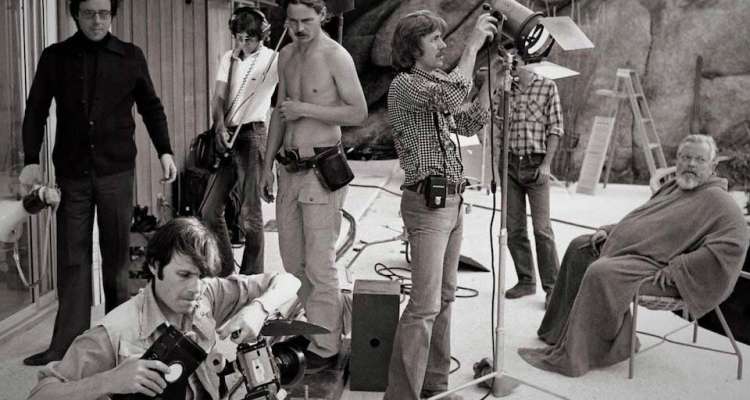Though he’s already won an Academy Award for “20 Feet from Stardom,” documentarian Morgan Neville isn’t often spoken of by film nerds with the kind of hushed reverence as greats like Errol Morris – but he deserves to be. As one of the top living documentary filmmakers, he has consistently created nonfiction films that are as entertaining as the best of their fiction counterparts with as much insight into their subjects as the more “serious” offerings in the genre. Released just months after his last celebrated Fred Rogers movie “Won’t You Be My Neighbor,” his latest, “They’ll Love Me When I’m Dead” is a remarkably first-rate exploration of a master and the film that eluded him: Orson Welles and “The Other Side of the Wind.” Neville biggest competition at next year’s Oscars could and probably should be himself.
READ MORE: Venice Film Festival Preview: 20 Most Anticipated Movies
After sitting unfinished for decades after Welles’ 1985 death, “The Other Side Of The Wind” is finally getting a release following help from original producers Frank Marshall and Filip Jan Rymsza as well as editor Bob Murawski at this year’s Venice and Telluride festivals (read our review of the film itself). Welles’ last, very-meta film centers on aging director Jack Hannaford (John Huston) and his on-the-rise protégé (Welles’ own apprentice, Peter Bogdanovich), as Hannaford tries to make his final movie, also titled “The Other Side of the Wind.” It doesn’t take an in-depth knowledge of Welles’ life and oeuvre to draw parallel’s to the filmmakers’ own experience, but Welles somehow insisted that it wasn’t autobiographical.
READ MORE: 55 Must-See Films: The 2018 Fall Movie Preview
“They’ll Love Me When I’m Dead” serves as a companion piece, the “Hearts of Darkness” to Welles’ ambitious final work as its narrator, Alan Cumming guides us through the troubled production, which began as an idea in 1970, and shot in on-again, off-again fashion for the better part of a decade. Welles was forever chasing similar success to what he found with “Citizen Kane,” which everyone reminds him could be the best film ever made as it hangs over every subsequent effort. With obstacles ranging from the prosaic (an actor’s conflicting schedule) to the political (the Iranian Revolution), Welles struggles to complete what he hoped would be his comeback, bringing him back into the good graces of the Hollywood system that both revered and then exiled him.
As playful as Welles himself, with an inventiveness he’d likely appreciate, “They’ll Love Me When I’m Dead” doesn’t take a standard approach to tell its story even taking some slippery cues (and clips) from Welles’ whimsical, late-’70s tricksy doc “F For Fake.” Of course, there’s the expected archival footage, old interviews, and clips from “The Other Side of the Wind.” Yet, Neville brings in deep cuts, unearthing outtakes of Welles and other unseen moments, giving even the most devoted Welles fans a fresh look at the much-documented icon. And it isn’t just the inclusion of these bits; it’s how they’re used in Neville’s narrative. The director takes a clip of Welles and uses it out of context, for example by inserting a shot of Welles saying “hello” on camera in telling the story of his introduction to someone. Each of these inspires wonder and delight at the editing dexterity, the creativity and simply finding the right video for the right moment. But the larger context is key here; while Neville keeps things reigned in by focusing solely on “The Other Side Of The Wind” (rather than making an all-encompassing biopic about the auteur), he also provides background on aspects of Welles’ life that inform his character and his experience on the production.
“They’ll Love Me When I’m Dead” is a cinephile’s treasure, providing deep insight into Welles as both a filmmaker and a person, as well as a wealth of surrounding figures like Marshall, Welles’ cinematographer Gary Graver and his collaborator/star/love Oja Kodar. Vintage footage of John Huston is a joy, particularly in illuminating his friendship with Welles, and the actor/director’s son Danny Huston shares his memories as well. Bogdanovich figures prominently, in both candid contemporary interviews as well as moments from the ’70s and ’80s, and the filmmaker and former ward grounds the largely fun, amusing film with tinges of sadness and regret.
As with his other films like “Best Of Enemies,” Neville knows how to make a subject supremely entertaining while never skimping on depth. His work is a delight to watch, but it always illuminates an aspect of a subject that even their most devoted fans may be unaware of. There’s been no shortage of study on Welles, but “They’ll Love Me When I’m Dead” offers a new understanding of the elusive, cunning filmmaker with a verve the man himself would have admired. [A-]
Check out all our coverage from the 2018 Venice Film Festival here.

